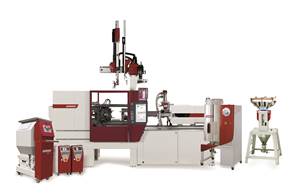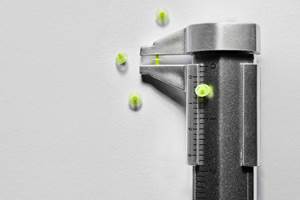Molder & Moldmaker Embraces Minimalist Tooling Philosophy
RenyMed’s niche consists of projects where it can offer not only molding, but help in designing and making the unique, compact, modular tools that are a company specialty.
RenyMed CEO Steve Raiken half-jokingly calls it his “Harry Potter closet.” The walls of the 6 x 8 ft space off the tool room are lined with shelves filled with small plastic containers. They give the initial impression that this is a compact storage area for various mold components. On closer inspection, however, visitors discover that each blue plastic container holds a production tool slid into protective netting.
For most injection molders, tool storage consists of pallet-lined floor-to-ceiling racks, where molds are moved to and from production by a combination of forklifts and overhead cranes. However, RenyMed, Baldwin Park, Calif., can store all its tooling in what amounts to a closet, with workers pulling a mold from its netting and dropping it into the appropriate modular base, which RenyMed also makes.
Says Raiken, “When we tell a potential customer we have a unique modular system, almost always they ask, ‘Is it a M.U.D. base?’ We show them 4-in. round cavity mold insert set with a robust 1/2-in. cooling channel that envelops the cavity, double slides that inter- lock the cavity, a side Y-corepull, and a helical unwind for a luer thread.
“We then install all this in a mold base with guided ejection and it becomes an SPI class 101 mold without an ejector pin mark on the part. The customer then says they have never seen a solution such as this. We then tell them this is scalable to four cavities. This is unique.” This modular tooling concept was developed by RenyMed about seven years ago. While it’s not a fit for every project, in the programs where it does work, it offers myriad benefits. In addition to shorter lead times, the compact tools require minimal storage space and can run on smaller machines. Those floorspace-saving benefits add up quickly in the costly California real-estate market.
From a production standpoint, the compact tooling minimizes residence time for the expensive, heat-sensitive resins RenyMed uses to mold precision medical components.
“Because it’s modular, we’re starting from the 40-yard line in terms of design,” says Raiken. “We’re getting a running start on the project.” As an example, he displays one part for which RenyMed was able to create tools for six different sizes in seven weeks.
“We make the most contained and concise mold,” Raiken says. “So, when we use this tooling, what we’re doing is asking, ‘What does the part require?’ rather than fitting the part into something we know.”
Raiken knows molds, having started a one-man tool shop in the mid-1980s after completing a moldmaking apprenticeship. That operation was carved out of unused space in the corner of an injection molder, and consisted of a mill, grinder, and lathe. Dissatisfied with the mold testing he was finding, Raiken decided to add a molding machine, which he did in a new space all to himself.
Raiken expanded his ´óĎó´«Ă˝ from there, taking on molding and growing along with the California medical-device market, which called for high-precision parts made from difficult materials in a race to the smallest that continues today. Ten years ago, RenyMed moved into its current space in Baldwin Park.
Raiken notes that most of the parts he makes weigh less than a gram. Exemplifying the small size and precise nature of the programs RenyMed takes on, when Plastics Technology visited, Raiken was preparing for a customer visit to discuss a new ophthalmology product used to hold the iris open during cataract surgery. For this project, as with well over 90% of its jobs, RenyMed will help design the tooling it will build and run.
“Our niche is creative DFM [design for manufacturing]. We provide our customers with creative manufacturing solutions that help them realize their medical device,” Raiken says. “At trade shows, molders lay out hundreds of parts, to say, ‘That’s what we do, we make plastic parts.’ Well that’s not what we do. We provide our customers with the ability to make their product.”
Related Content
IMM Cells Display Communications, Energy Measurement and Energy Recovery
NPE2024: Wittmann is featuring five injection molding machines incorporating its range of robotics and auxiliaries, with all products employing industry 4.0 communications, energy measurement and a brand-new red color.
Read MorePrecision Processing Requires Precision Equipment
Moretto offers plastics processors and micromolders for a broad suite of auxiliary solutions targeted specifically for precision processing.
Read MoreMilacron’s Massive Booth Highlights Multiple Brands
NPE2024: Coinjection of postconsumer resin, in-mold decoration, LSR micromolding and bioplastics processing are just some of the machine displays at Milacron's booth.
Read MoreSlimmer All-Electric Press Debuts
NPE2024: A slimmed-down version of Engel’s all-electric, e-mac injection molding machine is among eight displays, which also include LSR micromolding, quick mold changes and a cube mold.
Read MoreRead Next
See Recyclers Close the Loop on Trade Show Production Scrap at NPE2024
A collaboration between show organizer PLASTICS, recycler CPR and size reduction experts WEIMA and Conair recovered and recycled all production scrap at NPE2024.
Read MoreBeyond Prototypes: 8 Ways the Plastics Industry Is Using 3D Printing
Plastics processors are finding applications for 3D printing around the plant and across the supply chain. Here are 8 examples to look for at NPE2024.
Read More







